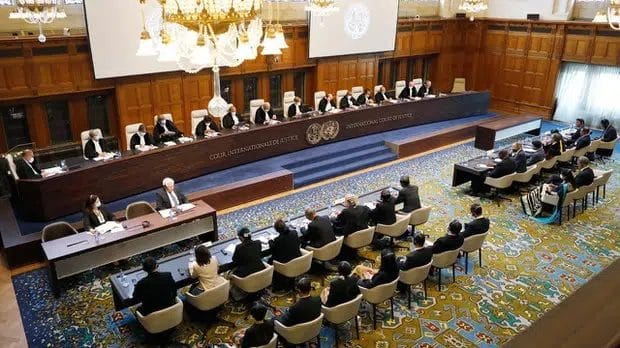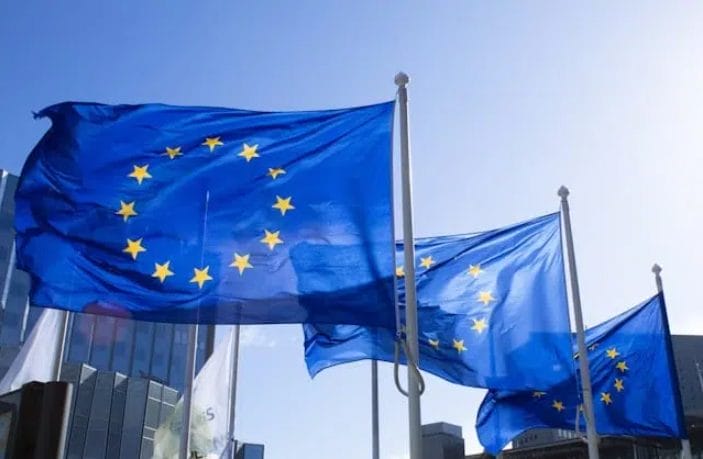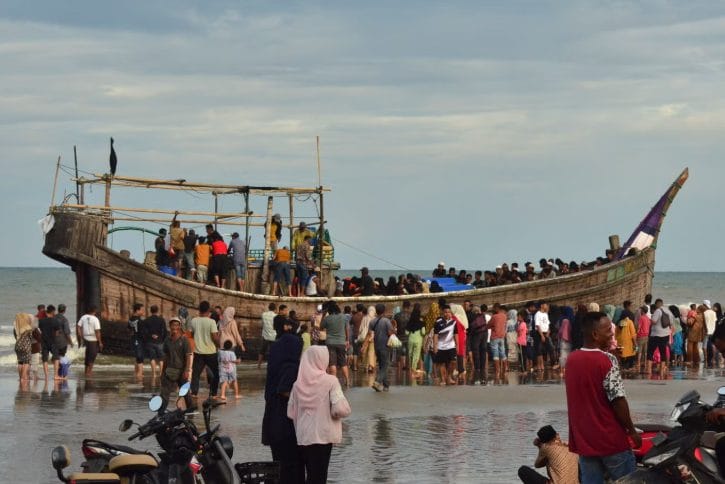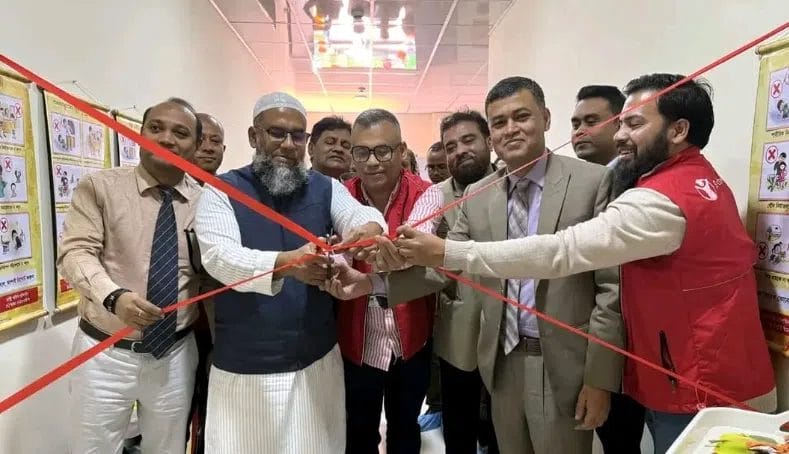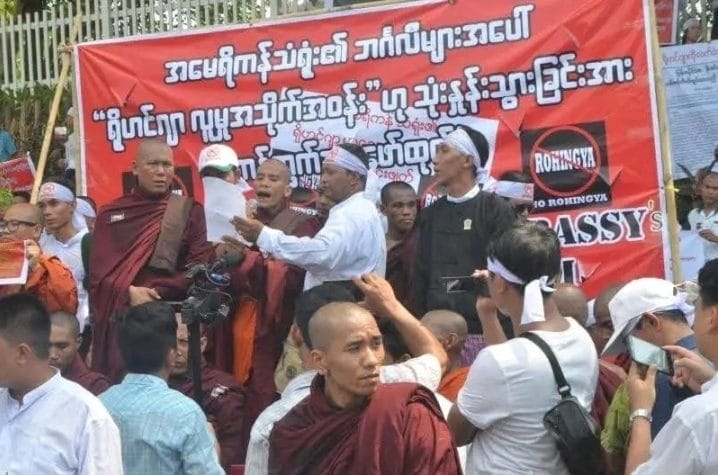Arakan News Agency | Exclusive
Eight years have passed since the “genocide” campaign committed against the Rohingya by the Myanmar military in Arakan State in the west of the country. Horrors were committed that remain engraved in the minds and hearts of the victims and their families memories that may never heal except through justice and accountability. Yet according to Rohingya refugees, that dream seems far from reach.
On August 25, 2017, the Myanmar military launched a brutal campaign against the Rohingya: thousands were killed, women were raped, people were burned alive, and villages were destroyed. Hundreds of thousands of Rohingya fled to neighboring Bangladesh, where their numbers have now exceeded one million refugees with no imminent solution in sight.
As the 8th anniversary approaches, the Rohingya carry the pain of the atrocities they endured alongside the hope that the world has not forgotten them, and that justice will inevitably come to hold the perpetrators accountable the first step toward justice, rights, and a safe return to their homeland.
The Most Brutal Genocide
The Co-founder of the Arakan Rohingya National Organization, Nay San Lwin, affirmed that the genocide of the Rohingya did not begin in 2017 but dates back to the 1970s, stressing that the violence eight years ago was the most brutal and widespread.
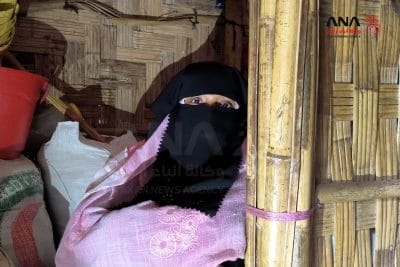
A Rohingya refugee named Roshida, who fled to Bangladesh after the genocide, said her village endured a massacre that lasted for hours, during which she saw her family members killed before her eyes and lost about seventy relatives.
She told Arakan News Agency: “My village, Tula Toli in Maungdaw, witnessed a massacre on August 22, 2017. It started at 7 a.m. and ended by noon after most of the villagers were killed with guns, swords, axes, and spears.” She added that only three people from her family survived, and she later reunited with them in the camps in Bangladesh.
In another Rohingya village called Diol Toli in Maungdaw, a similar massacre took place. Naji Mullah recounted witnessing the rape of young girls, people burned alive, and brutal torture.

He continued: “A group of people were gathered on the shore and dragged into a house where the girls were raped. Then the house was sealed and set on fire. Later we hid in the mountains where many children were killed — speared and hacked to death with swords.”
He added that he saw the elderly Imam of the village burned alive and tortured to death. “They burned the entire village, killed about five to six thousand people. It wasn’t just in my village but across all villages. Now, when we remember August 25, we drown in grief and deep mourning our souls and eyes weep. We are still demanding justice and our rights.”
Commemorating the Anniversary
As each anniversary comes, Rohingya refugees who spoke to Arakan News Agency emphasized that what they demand is justice and accountability for one of the world’s most horrific massacres, as well as the restoration of their rights and a guarantee of safe return to their homeland.
Nay San Lwin told Arakan News Agency that it is necessary to commemorate the genocide and its victims. He stressed that despite international recognition including by the United Nations that what happened on August 25 was genocide, recognition alone is not enough. The perpetrators must be held accountable, and justice must be achieved for the victims.
The newly elected Rohingya leader in the Bangladesh camps, Khin Maung, told Arakan News Agency that commemorating the genocide is of utmost importance to inform younger generations about what the Rohingya endured. He said: “We commemorate August 25 to remind the world of the crimes committed against us in 2017, when thousands of Rohingya were killed and nearly a million forced to flee to Bangladesh. We continue to mark the anniversary because justice has not been served, while we are still deprived of our basic rights.”
Justice and Accountability
Nay San Lwin warned that violence against the Rohingya may be repeated against those few who remain in Arakan, stressing that a new wave of violence is already unfolding, and in some ways may be even worse than the 2017 campaign.
He criticized the slow progress of international legal mechanisms such as the International Court of Justice and the International Criminal Court, stressing the need for greater effort to ensure perpetrators do not escape punishment. He added: “Because of this delay, more perpetrators have emerged. Arakanese Buddhist militias (the Arakan Army) are committing heinous crimes against the Rohingya. They must be stopped, and serious, concrete steps taken against them expressions of concern are no longer enough.”
Meanwhile, Dr. Tahir Mohammad Arakani, President of the Burma Human Rights and Development Forum, said the Rohingya tragedy did not end in 2017. Over a million live in harsh conditions in Bangladesh’s camps while perpetrators remain free, and those who remain in Arakan continue to face killings, threats, and starvation.
He told Arakan News Agency: “More than 25,000 people were killed in cold blood, over 350 villages and 40,000 homes burned, women raped, children slaughtered, and over a million Rohingya forced to flee to Bangladesh and neighboring countries.”
Arakani stressed that commemorating the genocide should not only be about remembering the past but also about reaffirming the Rohingya’s just demands, which should be raised at the upcoming United Nations conference on the Rohingya scheduled for September 30 in New York.
He outlined the Rohingya demands as: international recognition of the genocide and accountability for perpetrators, the right of safe and dignified return to Arakan under international protection, restoration of full citizenship and political and legal rights, improvement of refugee conditions in the camps, and the inclusion of Rohingya representatives in any dialogue or negotiations on Myanmar’s future.
He also urged the Rohingya to remain united and preserve their identity and culture, emphasizing that the Islamic world has a duty to support the Rohingya with prayers, material aid, moral and political backing. He said justice in the Islamic world cannot be complete without protecting the Rohingya’s rights and freedoms, adding that Islamic solidarity with the Rohingya is a true test of values of mercy and justice.
Today, over a million Rohingya refugees live in Bangladesh’s Cox’s Bazar camps, which the UN classifies as the largest refugee camp in the world, amid dire living conditions. Meanwhile, waves of displacement from Arakan to Bangladesh continue due to ongoing atrocities by Arakanese Buddhist militias, who target them with killings, violence, forced displacement, and forced recruitment.



